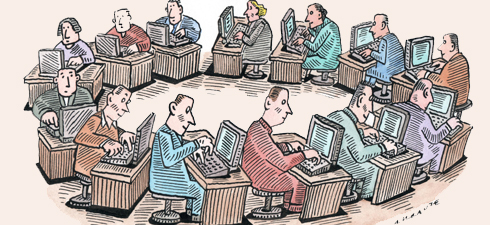According to the European Commission’s own figures, its entire administrative system comprises some 50,000 civil servants, who develop policy for around half a billion Europeans. And Brussels is not slow to brandish this ratio of one civil servant to ten thousand citizens.
Eurosceptics, such as the London-based think tank Open Europe and the Dutch Socialist Party (SP), nevertheless claim that the numbers are much higher. They also include the national civil servants who are involved in EU policy, which raises the figure to three times as many.
However, according to Nico Groenendijk, Professor of European Economic Governance, this is not an accurate comparison: “After all, we don’t include those municipal civil servants who are engaged in the field of national policy in the Netherlands either.”
Administration — six percent of EU budget
The question nevertheless remains whether there are actually too many. Sadly, the majority of comparisons fail to hit the mark. In an effort to emphasise the claim that the administrative system in Brussels is small and efficient, it is often pointed out that it employs just as many civil servants as a city like… Berlin for instance.
Berlin also has a sanitation department, however, whereas the EU comprises primarily highly educated, well-paid policy-making officials. Nor is there any point in a comparison with the United States (which is forty times as large); defence is a federal matter in its case, which it is not in Europe.
Perhaps there are not too many civil servants after all, given the vast policy area for which they are responsible. What about the costs, though? All those documents that have to be translated into 23 languages (over a billion euros annually). Administration has accounted for almost six percent of the entire European budget for years now.
And while this is considerably lower than that of the Dutch central government (almost thirty percent), the latter does include the tax authorities, or the national auditor’s office. They simply cannot be compared.
“Bureaucracy is control”
Whichever way you look at it, claims Rinus van Schendelen, Professor of Political Science, the level of bureaucracy in Brussels is tiny. “The government in The Hague – not including institutions such as the army, the police and education – has one civil servant for every 133 inhabitants. The Commission has one for every 20,800 EU inhabitants. You can’t argue with statistics!”
And while almost all experts share this opinion, might Brussels nevertheless remain highly bureaucratic? Political scientist Ben Crum insists that it is indeed, although he emphasises that bureaucracy, as Max Weber saw it, is not a bad thing: “Bureaucracy is control.”
And that is exactly the reasoning behind all those forms that have to be completed. “If you want to allocate subsidies among 27 countries, then bureaucracy is the only means of checking that it is done correctly. Many of those people who complain the most about bureaucracy are also the first to object to subsidies being granted to unfarmed olive orchards. You can’t have it both ways. Given the circumstances, I don’t think Europe is actually excessively bureaucratic.”
Was this article useful? If so we are delighted!
It is freely available because we believe that the right to free and independent information is essential for democracy. But this right is not guaranteed forever, and independence comes at a cost. We need your support in order to continue publishing independent, multilingual news for all Europeans.
Discover our subscription offers and their exclusive benefits and become a member of our community now!












